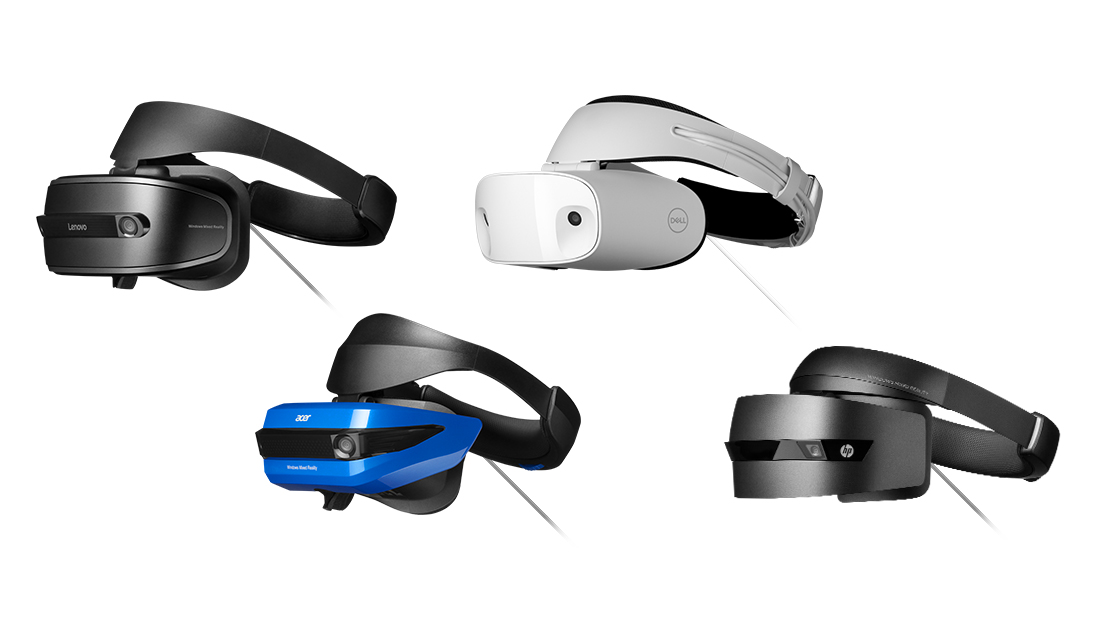Windows Mixed Reality HMDs: A Spec Comparison
There are now five Windows Mixed Reality HMDs ready for pre-order ahead of the October 17 launch of the Windows Fall Creators Update, and you’ll notice a certain amount of parity between them all. This is on purpose; Microsoft is applying the same paradigm to these headsets as we’ve seen on PCs for many years. That is, you build a platform with a range of specifications, and various OEMs build their own hardware on that platform within that range.
There are, in fact, just a few differences within the Windows Mixed Reality platform that may inform which headset you end up buying. Below is a handy chart comparing the specs of all six HMDs. (Note that the Asus HMD is the only one not yet ready for preorder, but we've included it here because we know some details about it.)
Note that we’re still awaiting full specifications, so there are some blank cells below. We’ll add more information as it becomes available.
| Header Cell - Column 0 | Acer | Asus | Dell | HP | Lenovo | Samsung |
|---|---|---|---|---|---|---|
| Display Res | 2880 x 1440 (1440 x 1440 per eye) | 2880 x 1440 (1440 x 1440 per eye) | 2880 x 1440 (1440 x 1440 per eye) | 2880 x 1440 (1440 x 1440 per eye) | 2880 x 1440 (1440 x 1440 per eye) | 2880 x 1600 (1440 x 1600 per eye) |
| Display Type | LCD | -- | LCD | LCD | LCD | AMOLED |
| Refresh Rate | Up to 90 Hz | Up to 90 Hz | Up to 90 Hz | -- | Up to 90 Hz | Up to 90 Hz |
| FoV | 95 degrees | 95 degrees | 110 degrees | 95 degrees | 105 degrees | 110 degrees |
| Audio | 3.5mm Combo Jack | 3.5mm Combo Jack | -- | 3.5mm Combo Jack | 3.5mm Combo Jack | -Built-in spatial AKG headphones-Built-in dual-array mics |
| Tracking | 6DoF, Inside out | 6DoF, Inside out | 6DoF, Inside out | 6DoF, Inside out | 6DoF, Inside out | 6DoF, Inside out |
| Ports | -HDMI 2.0-USB 2.0 | -HDMI 2.0-USB 2.0-Cable is 4m | -- | 2-in-1 HDMI 2.0 and USB 3.0 cable | 2-in-1 HDMI 2.0 and USB 3.0 cable | 2-in-1 HDMI 2.0 and USB 3.0 cable |
| Sensors | -Accelerometer-Gyroscope-Magnetometer -Proximity Sensor | -Accelerometer-Gyroscope-Magnetometer -Proximity Sensor | -Accelerometer-Gyroscope-Magnetomer | -Accelerometer-Gyroscope-Proximity Sensor | -- | -Accelerometer -"Gyrometer"-Compass(3 Axis)-Proximity Sensor-IPD Sensor |
| Dimensions | 195.8 x 94.8 x 106.59mm | -- | 210 x 330mm (W x L) | 127.8 x 338.8 x 176mm | -- | 202 x 131 x 111mm (WxDxH) |
| Weight | 350g | Under 400g | -- | 834.6g | -- | 645g |
| OS Support | Windows 10 Fall Creators Update | Windows 10 Fall Creators Update | Windows 10 Fall Creators Update | Windows 10 Fall Creators Update | Windows 10 Fall Creators Update | Windows 10 Fall Creators Update |
| Misc. | Bundled with 2 motion controllers | -Bundled with 2 motion controllers-Face cushion has fast-drying, antibacterial coating | Option to bundle with 2 motion controllers | Bundled with 2 motion controllers | -Option to bundle with 2 motion controllers-Cortana voice control-Keyboard and mouse input support | Bundled with 2 motion controllers |
| Availability | Oct 17 | Unannounced | Oct 17 | Oct 17 | Oct 17 | Nov 6 |
| Price | $400 | Unannounced | $350 (base)$450 (bundle) | $450 | $400 | $500 |
Note that all of these HMDs have the same display resolution and (maximum), refresh rate, and display type--except for the Samsung Odyssey, which has a superior resolution 2880 x 1600 (1440 x 1600 per eye) and an AMOLED display instead of an LCD. It also ties Dell for the best FoV, at 110 degrees, compared to most of the other devices’ 95 degrees. The Lenovo Explorer isn’t far behind, though, at 105 degrees FoV.
The devices are slightly different sizes and weights, too, so if those aspects of your preferred HMD are of concern, you may want to take a look at those differences. Of particular note is the HP HMD, which tops the scales at 834.6g, which is more than twice the weight of some of the other models. The Samsung Odyssey is (so far) the second heaviest, weighing in at 645g.
Only the Dell Visor is available either in a bundle with a pair of Windows Mixed Reality motion controllers or as just a base HMD. This is an intriguing move, because we’ve demoed a number of WMR experiences using an Xbox controller, and although the motion controllers are superior for many uses, the Xbox controller is not a bad input tool. It will just significantly limit what you can do with an HMD.
The table above shows that the Lenovo Explorer supports not just the motion controllers and an Xbox controller, but keyboard/mouse input and Cortana-powered voice commands. We're unsure at this time which (if any) of the other HMDs offer the same. We suspect that some do.
Get Tom's Hardware's best news and in-depth reviews, straight to your inbox.
Of course, when you get down to it, you’re going to be looking at price concerns. Surprisingly, there’s a big of price disparity here. The Acer and Lenovo HMDs look to be the best value, at $400. The Samsung device is a full $100 more expensive, at $500, which is presumably a markup because of the display and higher-quality audio setup.
The Dell and HP headsets split the difference at $450 each, although the base Dell Visor is the least expensive way you can get into a Windows MR headset at $350.
You can also pick up a pair of the motion controllers separately for $100.
Seth Colaner previously served as News Director at Tom's Hardware. He covered technology news, focusing on keyboards, virtual reality, and wearables.
-
karma77police Whether is MR or VR i get bad headache and nausea, not for me. I wonder about other people and their experience with it.Reply -
apesoccer Ok...So they're all relatively the same, with different purchase price and color. Got it. Does it work with games, are the windows vr goggles just basically a monitor (can you change resolutions, or is there basically only the 1 resolution that it always runs at), how do they compare to other VR setups...do they require the same types of hardware that the other VR setups require? (High end graphics card and decent cpu). Is this only for Xbox, does it also work for Xbox...does it work for playstation?Reply -
bit_user I'm predicting further price cuts in January, after disappointing holiday sales numbers.Reply -
c4s2k3 Reply20238750 said:I'm predicting further price cuts in January, after disappointing holiday sales numbers.
Yeah, price is a big issue, but if we don't see a significant number of compelling applications and other content during 2018, I think "VR" as we know it on PCs will go the way of 3D TV. Even low-cost VR hardware is pointless if there isn't enough compelling content to warrant the investment.
-
scolaner Reply20238734 said:What's the official word on recommended GPUs?
That's all here: http://www.tomshardware.com/news/how-to-check-pc-compatibility-windows-mixed-reality,35606.html
Update:
And here: http://www.tomshardware.com/news/windows-mixed-reality-system-requirements-oculus-vive-osvr,35629.html -
scolaner Reply20244874 said:20238750 said:I'm predicting further price cuts in January, after disappointing holiday sales numbers.
Yeah, price is a big issue, but if we don't see a significant number of compelling applications and other content during 2018, I think "VR" as we know it on PCs will go the way of 3D TV. Even low-cost VR hardware is pointless if there isn't enough compelling content to warrant the investment.
If they can get the SteamVR ports to work properly, it's going to be great. http://www.tomshardware.com/news/microsoft-windows-mixed-reality-content-steam-halo,35324.html
They can already get their own UWP stuff on there. What they do is let you view those apps (email, web browser, even Excel) in 2D windows within the XR environment. I find that use case extremely compelling--so long as they can develop smaller, lighter hardware. -
scolaner Reply20238433 said:Ok...So they're all relatively the same, with different purchase price and color. Got it. Does it work with games, are the windows vr goggles just basically a monitor (can you change resolutions, or is there basically only the 1 resolution that it always runs at), how do they compare to other VR setups...do they require the same types of hardware that the other VR setups require? (High end graphics card and decent cpu). Is this only for Xbox, does it also work for Xbox...does it work for playstation?
That's a lot of questions.
Here are some recent articles we've done on this. Start there. :D
http://www.tomshardware.com/news/how-to-check-pc-compatibility-windows-mixed-reality,35606.html
http://www.tomshardware.com/news/microsoft-windows-mixed-reality-content-steam-halo,35324.html
http://www.tomshardware.com/news/microsoft-windows-mixed-reality-hmds-preorder,35593.html
http://www.tomshardware.com/news/samsung-odyssey-windows-mixed-reality,35597.html
http://www.tomshardware.com/news/halo-recruite-short-not-game,35608.html
Some short answers: The HMDs have a max res they can support, but games/experiences may have a lower res. The HMDs are fixed in that way.
These do not work with the Xbox...yet. I'd be shocked if they didn't roll out something like that super soon, though. PlayStation has its own VR HMD, so that's a no.
As for comparison to other HMDs, we'll wait for our full reviews to make any strong statements either way. Anecdotally, after experiencing many demos, I think the experience of these devices is comparable to Rift/Vive. -
scolaner Reply20237918 said:Whether is MR or VR i get bad headache and nausea, not for me. I wonder about other people and their experience with it.
What HMDs/experiences have you tried? There are some that get me sideways, but by and large I don't have any issues anymore, now that they've gotten good at things like locomotion and high-enough res.

